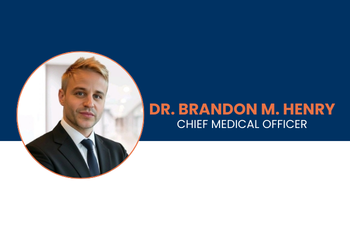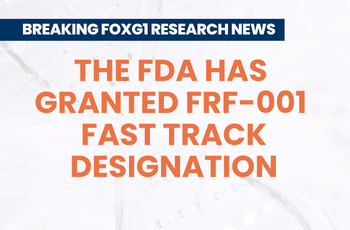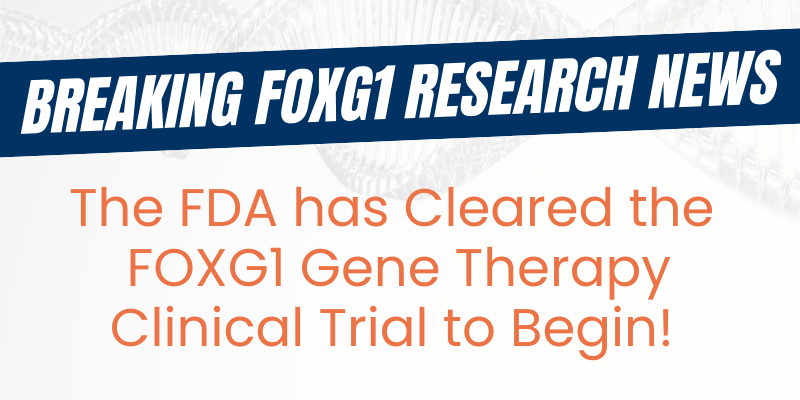FOXG1 Research Foundation Names Dr. Brandon M. Henry Chief Medical Officer
The FOXG1 Research Foundation has named Brandon M. Henry, M.D., as Chief Medical Officer as FRF-001 advances toward a first-in-human clinical trial. Dr. Henry brings deep experience in AAV gene therapy development and will lead clinical strategy and oversight as we prepare to move into patient clinical trials.
As a parent-led organization serving as the independent sponsor of a multi-site, international gene therapy trial, FRF is pioneering a new rare disease model—advancing treatment with urgency while upholding the highest scientific and regulatory standards. Dr. Henry’s leadership strengthens our path forward as we work to bring a potential treatment to children and families impacted by FOXG1 syndrome.
The FDA has granted FRF-001 Fast Track Designation
The FOXG1 Research Foundation announced that the U.S. Food and Drug Administration (FDA) has granted Fast Track Designation to FRF-001 for the treatment of FOXG1 syndrome — marking another major regulatory milestone as we advance toward our first-in-human Phase 1/2 clinical trial.
The FDA Clears the FOXG1 Gene Replacement Therapy Clinical Trial to Begin!
The FOXG1 Research Foundation announced that the U.S. Food and Drug Administration (FDA) has cleared its Investigational New Drug (IND) application to begin first-in-human clinical trials for FRF-001, the first FOXG1 AAV9 gene replacement therapy. This historic milestone marks the first instance of a parent-led rare disease nonprofit foundation independently sponsoring its own multi-site, international gene therapy clinical trial.
Charles River Collaborates with FOXG1 Research to Advance Gene Therapy
WILMINGTON, Mass.--(BUSINESS WIRE)--Jul. 30, 2024-- Charles River Laboratories International, Inc. (NYSE: CRL) announced today a collaboration with the FOXG1 Research Foundation (FRF) highlighting the patient advocacy group’s model to independently drive drug development through the clinical phase. The parent-led global organization driving the research to cure FOXG1 syndrome and related neurological disorders will collaborate with Charles River in a comprehensive gene therapy contract development and manufacturing organization (CDMO) agreement.
“Charles River is proud to work with the FOXG1 Research Foundation to advance its gene-therapy through clinical trials,” said Kerstin Dolph, Corporate Senior Vice President, Global Manufacturing, Charles River. “The FOXG1 patient population has an incredible unmet need, and we are looking forward to lending our expertise to FRF as they continue to trailblaze a path toward providing rare disease treatments.
2023 Impact Report
2023 marked six years of the FOXG1 Research Foundation. We are a parent-driven, global foundation with the mission to help improve the lives of every person affected by FOXG1 syndrome worldwide. We are known in the industry as innovators as we focus on three equally critical areas: FOXG1 science, FOXG1 patient data, and FOXG1 patients and community. From advancing our gene therapy program to building our own bioinformatics platform, to helping guide parents through the rare disease medical caregiver journey, this year has been a year of upward progress in all three areas. Here are the FOXG1 Research Foundation highlights from 2023 and goals for 2024.
FRF Appoints Chief Drug Development Officer, Dr. Gai Ayalon
Dr. Ayalon is a distinguished neuroscientist and drug developer, who over many years led teams and spearheaded drug development programs for neurological diseases including rare neurodevelopmental disorders, spanning the discovery, translation and clinical phases. He joins our foundation at a critical and pivotal juncture as we enter Phase Four on our Path to a Cure, taking programs through safety studies and clinical trials.
Dr. Soo-Kyung Lee Named FOXG1 Research Foundation Chief Scientific Officer
The FOXG1 Research Foundation (FRF), announced today the appointment of Dr. Soo-Kyung Lee as the new Chief Scientific Officer of the FOXG1 Research Foundation. Dr. Lee is an Empire Innovation Professor and Om P. Bahl Endowed Professor at University at Buffalo Department of Biological Sciences. Since joining the FRF in 2017, Dr. Lee has elevated the FOXG1 research center at the University at Buffalo to a global leader in the field. Her exceptional work has garnered around $3M annually from federal agencies, FRF, UB, and the Simon Foundation Autism Research Initiative (SFARI), notably receiving SFARI's 2022 Genomics of ASD: Pathways to Genetic Therapies award.
Dr. Lee’s dedication to curing FOXG1 syndrome is deeply personal as a mother to Yuna, diagnosed with FOXG1 syndrome in 2009. Her passion and commitment have inspired everyone fortunate enough to work with her. It's a rare and special circumstance to have FOXG1 parents leading the scientific journey towards effective therapeutics for all FOXG1 children globally.
COMBINEDBrain Biorepository enrolling FOXG1 participants at conferences across the USA
CombinedBrain invites FOXG1 families to go to any CombinedBrain member’s rare disease conferences to join the Biorepository for exciting Biomarker studies. Read more to find the next conference closest to you.
New Children's Book and Digital Platform "Joyfully Josie" Aims to Spark Conversations Around Disabilities, Rare Diseases, and Inclusion
Nicole Zeitzer Johnson announced today the release of her debut book, "Joyfully Josie." Designed to help parents and families discuss inclusion in the context of disabilities, this captivating children's book series aims to foster understanding of rare diseases and the experiences of medically complex individuals.
The most personalized medicine: Studying your own child’s rare condition
Article from Spectrum News, the leading site for autism research news. Excerpt:Attracting parents who are also scientists to the cause only turbocharges those efforts. Nasha Fitter, a cofounder of the FOXG1 Research Foundation, a parent-led foundation for research on an autism-linked condition called FOXG1syndrome, could hardly believe it when she stumbled on a 2017 Facebook post by FOXG1 parent Soo-Kyung Lee about a grant she and her husband, Jae Lee, both respected neuroscientists, had secured. “Hold up, you guys are parents and you’re scientists?” she remembers thinking, even before she knew of their expertise and reputation for rigor. The Lees now lead the FOXG1 Center of Excellence at the University at Buffalo in New York State and receive considerable funding from the foundation. FOXG1 families are unfortunate in many ways, Fitter says, “but we’re very fortunate with Soo and Jae.”
Rarebase launches a neuroscience drug discovery platform collaborating with 15 rare disease patient organization
Rarebase launches a neuroscience drug discovery platform collaborating with 15 rare disease patient organizations including the FOGX1 Research Foundation, SynGAP Research Fund, , STXBP1 Research Foundation, Hereditary Neuropathy Foundation, and more. The Function platform enables drug and target discovery for rare genetic diseases.
ONCE UPON A GENE - The 12 Commandments to Guide You When You're Starting a Rare Disease Patient Advocacy Group. With Nasha Fitter and Mike Graglia
Effie Parks celebrated podcast Once Upon a Gene Episode 094: FOXG1 advocate Nasha Fitter and SYNGAP1 advocate Mike Graglia are leaders in the rare disease community and two of the top parent leaders in the advocacy game. In this episode, they're sharing their knowledge, expertise and experiences in an information-packed masterclass on how to build a rare disease patient advocacy group, get funding and forge a path to a cure.





